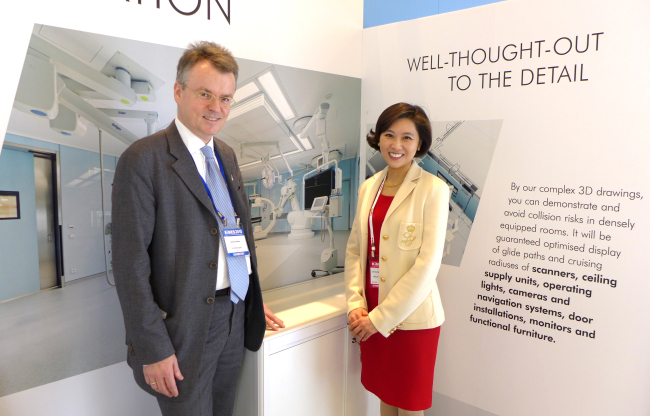Germany’s leading health care companies participated in the 2015 Korea International Medical and Hospital Equipment Show earlier this month in Seoul, laying the groundwork for joint ventures and research innovation with Korean partners.
Fifteen German firms producing specialized medical equipment took part in the 31st convention at Coex in southern Seoul from March 5-8 to showcase their products and services in consultations, clinical examinations, radiology, dentistry, surgery, physiotherapy, medical information systems, oriental medicine and pharmaceuticals, among others.
With Korea’s medical research and tourism sectors breaking new ground in an era of diversifying consumer habits, German companies can help by offering their industry-leading technologies and best practices, participating representatives told The Korea Herald on March 6.
“Korea is at the forefront of medical research in many specific areas in the world, but research results need to be translated into market practices in the health care business,” Deputy Head of Mission of the German Embassy Theodor Schuster said. “With our state-of-the-art expertise and world-leading technology, Germany is a perfect match for Korea’s hospitals.”
Fifteen German firms producing specialized medical equipment took part in the 31st convention at Coex in southern Seoul from March 5-8 to showcase their products and services in consultations, clinical examinations, radiology, dentistry, surgery, physiotherapy, medical information systems, oriental medicine and pharmaceuticals, among others.
With Korea’s medical research and tourism sectors breaking new ground in an era of diversifying consumer habits, German companies can help by offering their industry-leading technologies and best practices, participating representatives told The Korea Herald on March 6.
“Korea is at the forefront of medical research in many specific areas in the world, but research results need to be translated into market practices in the health care business,” Deputy Head of Mission of the German Embassy Theodor Schuster said. “With our state-of-the-art expertise and world-leading technology, Germany is a perfect match for Korea’s hospitals.”

Germany is Europe’s largest medical technology market and manufacturer with nearly 1,200 medium-sized enterprises employing 125,000 people and 11,300 small companies employing 70,000. International revenue reached 17 billion euros ($17.8 billion) in 2013, and the industry is expected to grow at around 3.8 percent annually until 2018.
Germany exports more than 50 percent of its medical products to the European market, followed by North American and Asian markets at around 18 percent each. Export of German products to Korea has grown by 50 percent over the last five years, reaching 234 million euros in 2014; Germany imported 100 million euros of equipment from Korea in the same year.
According to the German Industry Association Spectaris, Germany’s medical technology industry consists almost entirely of small and medium-sized enterprises that rely on high-innovation capacities and export-led strategies. There is close cooperation between universities, companies and hospitals for research and development, with companies investing an average 9 percent of their revenues in research.
Schuster explained that there is a long process from fundamental research to applicable research that leads to production. While the public sector invests mostly in fundamental research, the private sector concentrates more on practical and applicable fields, making two-way collaboration critical, he said.
For German companies, an international partnership is not only for selling products and services, according to the Charge d‘Affaires, as they constantly look for research collaboration and innovation.
Samsung Medical Center’s clinical assistant professor Alice Tan said creating partnerships with German companies will help upgrade the service quality of Korea’s growing medical tourism industry.
“Korea already has excellent doctors, but what we need are high-quality equipment and medication for attracting medical tourists,” she said. “By opening our market, we can gain access to the best available technology and exchange ideas of global standards.”
Tan highlighted that despite concerns for increased costs to patients, particularly on low-income people, health care privatization also brings a number of benefits, including increased investment in medical research and infrastructure.
As a growing number of foreign hospital groups is interested in purchasing Korean hospitals, she noted, industry collaboration will benefit both foreign investors and domestic professionals.
The convention annually draws around 1,000 exhibitors and 70,000 visitors. Participating German companies included: Daniel Siegfried Block, EE-Systems, Gossen Metrawatt, HT Labor + Hospitaltechnik, Institute Virion, Serion, LEA Medizintechnik, MT Promedt Consulting, Nicolay, Perpedes, Prameta, Rebotec Rehabilitationsmittel, Rudolf Riester, Schott, Somatex Medical Technologies and Tradex Services.
By Joel Lee (joel@heraldcorp.com)
-
Articles by Korea Herald



![[Herald Interview] 'Amid aging population, Korea to invite more young professionals from overseas'](http://res.heraldm.com/phpwas/restmb_idxmake.php?idx=644&simg=/content/image/2024/04/24/20240424050844_0.jpg&u=20240424200058)







![[Hello India] Hyundai Motor vows to boost 'clean mobility' in India](http://res.heraldm.com/phpwas/restmb_idxmake.php?idx=644&simg=/content/image/2024/04/25/20240425050672_0.jpg&u=)






![[Today’s K-pop] NewJeans' single teasers release amid intrigue](http://res.heraldm.com/phpwas/restmb_idxmake.php?idx=642&simg=/content/image/2024/04/26/20240426050575_0.jpg&u=)